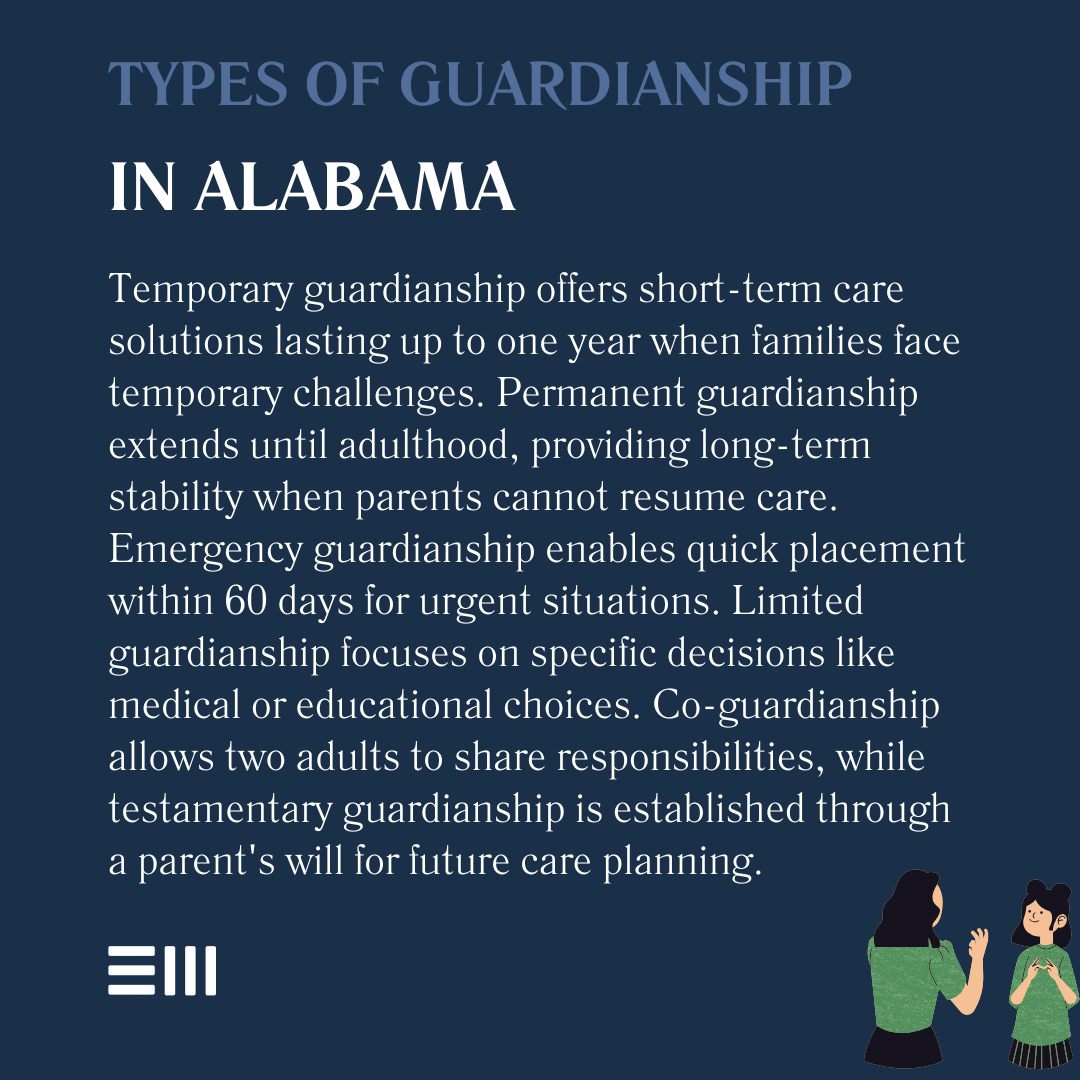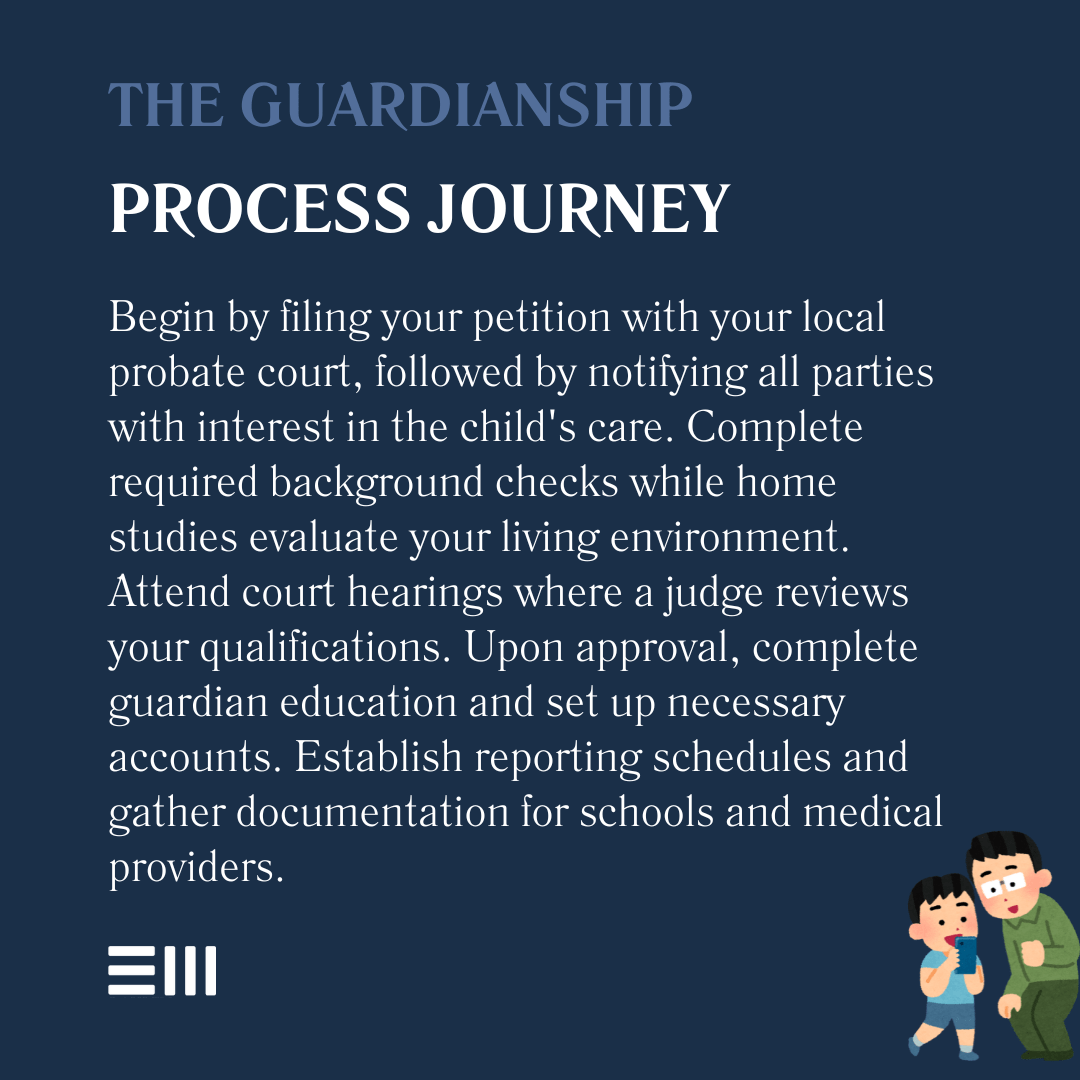Nearly 7.6 million children in the United States live in households headed by grandparents or other relatives.
This statistic highlights the growing importance of understanding guardianship options for protecting Alabama's youngest residents, particularly as family structures continue to evolve and adapt to modern challenges.
Understanding Legal Guardianship in Alabama
Legal guardianship provides a formal arrangement where a court appoints a responsible adult to care for a minor child when parents are unable to do so.
In Alabama, this process ensures children receive proper care while maintaining family connections and stability. The state's legal framework prioritizes the best interests of the child while respecting the complex dynamics of family relationships.
The guardianship system in Alabama operates under specific guidelines designed to protect children's interests while respecting parental rights.
Courts carefully evaluate potential guardians to ensure they can provide a stable, nurturing environment for the child. This evaluation process reflects Alabama's commitment to protecting its youngest residents while preserving family bonds whenever possible.
Several key factors distinguish guardianship from other care arrangements:
- Guardians make important decisions about education, healthcare, and daily care;
- Parents retain their parental rights but temporarily transfer decision-making authority;
- The arrangement can be modified or terminated if circumstances change;
- Courts maintain oversight to ensure the child's needs are met;
- Guardians must provide regular updates on the child's well-being; and
- The relationship maintains legal recognition across Alabama counties.
Understanding these fundamentals helps families make informed decisions about their children's care and future well-being. The flexibility of guardianship arrangements allows families to create stable environments while adapting to changing circumstances.
Types of Guardianship Available in Alabama
Alabama recognizes different forms of guardianship to address various family situations and needs. Each type serves specific purposes and comes with distinct responsibilities, allowing families to choose the most appropriate arrangement for their circumstances.
The state offers these primary guardianship options:
- Temporary guardianship: Limited-duration arrangements for specific circumstances, typically lasting 6-12 months;
- Permanent guardianship: Long-term care solutions when parents cannot resume care, lasting until the child reaches adulthood;
- Limited guardianship: Restricted authority for particular decisions or time periods, often used for medical or educational needs;
- Emergency guardianship: Immediate placement for urgent situations, usually valid for 30-60 days;
- Co-guardianship: Allowing two adults to share guardianship responsibilities; and
- Testamentary guardianship: Established through a parent's will or estate plan.
These options provide flexibility in meeting children's needs while maintaining appropriate legal protections for all parties involved. Each type of guardianship can be tailored to address specific family circumstances and challenges.
Requirements for Becoming a Guardian
Potential guardians must meet specific criteria to ensure they can effectively care for a minor child. Alabama courts carefully evaluate candidates to protect children's best interests and promote positive outcomes.
Qualifying guardians typically need to demonstrate:
- Clean criminal background with no history of abuse or neglect;
- Financial stability to support the child's needs;
- Physical and mental capacity to provide care;
- Stable living environment suitable for children;
- Willingness to maintain family connections;
- Ability to meet the child's educational and medical needs;
- Strong community ties and support system;
- Flexibility to accommodate the child's schedule;
- Understanding of child development and emotional needs; and
- Commitment to ongoing communication with the court.
Meeting these requirements helps ensure children receive appropriate care in safe, nurturing environments. The court may also consider additional factors based on the specific circumstances of each case.
The Legal Process for Obtaining Guardianship
Securing guardianship involves several steps through the Alabama court system. Understanding this process helps families navigate the legal requirements effectively while minimizing delays and complications.
The typical process includes these steps:
- Filing a petition with the probate court in the child's county;
- Providing notice to all interested parties;
- Completing background checks and home studies;
- Attending court hearings;
- Receiving court approval and official appointment;
- Completing guardian education requirements;
- Establishing financial accounts if necessary;
- Setting up regular court reporting schedules;
- Obtaining necessary documentation for schools and medical providers; and
- Creating a transition plan for the child.
Following these procedures carefully helps ensure a smooth transition and protects everyone's legal rights throughout the process. Each step serves a specific purpose in safeguarding the child's interests.
Rights and Responsibilities of Alabama Guardians
Guardians assume significant responsibilities while gaining specific legal rights to care for their ward.
Understanding these obligations helps guardians fulfill their roles effectively and create positive outcomes for children under their care.
Key responsibilities include:
- Providing safe, stable housing;
- Ensuring proper medical care and education;
- Managing the child's finances and assets;
- Making important life decisions;
- Reporting regularly to the court;
- Maintaining family relationships when appropriate;
- Advocating for the child's needs in various settings;
- Coordinating with healthcare providers and educators;
- Planning for the child's future; and
- Protecting the child's personal property.
Fulfilling these duties helps create positive outcomes for children under guardianship care while ensuring compliance with legal requirements.
Frequently Asked Questions about Guardianship in Alabama
Understanding guardianship often raises numerous questions.
Here are answers to common concerns about guardianship in Alabama.
How Long Does the Guardianship Process Take?
The timeline typically ranges from 6-12 weeks, depending on case complexity and court schedules. Emergency cases may be expedited when necessary.
What Happens if Parents Want to Regain Custody?
Parents can petition the court to terminate guardianship by demonstrating their ability to resume care and showing changed circumstances.
Can Guardians Move Out of State?
Court approval is required before relocating with the ward outside Alabama. The court considers the child's best interests in these decisions.
How Much Does Guardianship Cost?
Filing fees range from $150-300, with additional costs for legal representation if needed. Fee waivers may be available for qualified applicants.
What Support is Available for Guardians?
Alabama offers various resources, including financial assistance, support groups, and educational programs for guardians.
Do Biological Parents Have Visitation Rights?
The court may establish visitation schedules based on the child's best interests and family circumstances.
Taking the Next Step to Protect Your Child's Future
Your commitment to understanding guardianship shows dedication to securing your child's well-being.
Our experienced legal team stands ready to guide you through each step of the guardianship process, ensuring your child's interests remain protected while providing the support and guidance your family needs.
Contact us today for a confidential consultation to discuss your family's unique needs and create a plan that provides security for your child's future.
Let our knowledge and experience work for your family's benefit as you navigate this important decision.


